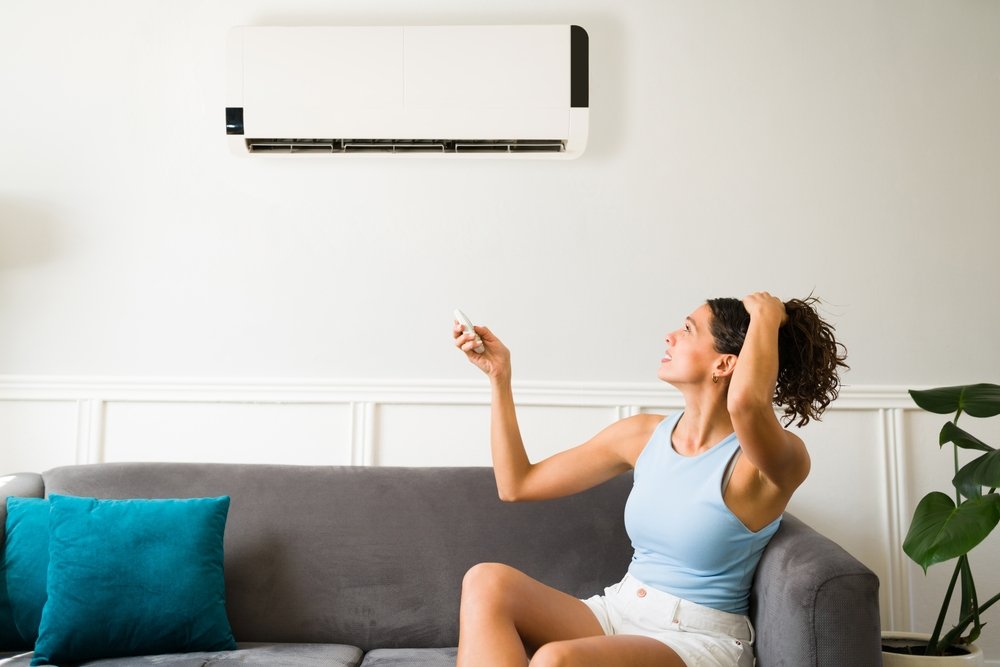AC Not Blowing Cold Air: 13 Common Reasons + Solutions
Have you ever come home after a long, hot day at work only to discover your AC is not working? When temperatures rise, having the ability to stay cool is essential. If you find out your AC isn't blowing cold air, you must immediately seek a repair. However, bear in mind that several things could be the cause.
Here are 12 different reasons your AC might not blow cold air and the solutions to fix them. By the end of this article, we hope you get the answer for your AC not blowing cold air.
1. Power Issues
Power interruptions and electrical surges can interrupt the electrical circuit that powers your air conditioner. There's a bright, momentary flash of light, which signals the problem. You can often hear the power come back on, and the system comes back on.
If there's no cooling, check the thermostat to see if it's displaying the correct temperature. If the breaker isn't tripped, check your electrical panel and switch the breaker back on. If the air conditioner still doesn't turn on, contact your HVAC company.
2. Leaking or Low Refrigerant
If your air conditioner isn't running long enough or hard enough, it could be a refrigerant leak or low refrigerant. If your air conditioner isn't running long enough or hard enough, it could be a refrigerant leak or low refrigerant.
But if your refrigerant levels are low, you should change them. We recommend that you leave these issues to HVAC professionals. It's best to leave your HVAC repairs to someone who knows your AC inside and out.
Also Read: Resetting Your AC After a Power Outage
3. Dirty or Clogged Filter
If your air filter is dirty, it can reduce airflow, pressure, and heat transfer, limiting your air conditioner’s efficiency. It can cause the air conditioner to work harder, which can increase energy costs and cause wear.
Air filters become dirty from everyday living and could need changing every three months, depending on usage. The filter might need to be cleaned or replaced. If the filter is dirty but appears fine otherwise, you should clean it.
4. Issue with Evaporator Coil or Condenser
The evaporator coil and condenser are the components inside that remove heat from the air, blowing cool air into the room. If you notice frost or ice on the inside or outside of these units, it is probably time to call an AC professional.
Sometimes, the evaporator coil freezes because the refrigerant is low. When the refrigerant is low, the compressor may work harder to try and cool the home. This can cause the coil to freeze.
The condenser is outside and can become clogged with debris, including dust and dirt. This causes the compressor to do extra work as the system tries to cool, which can also cause ice to build up on the coil.
Neither of these issues is easily diagnosed. If you are uncertain about correcting the problem, call an HVAC professional immediately.
Also Read: 8 Reasons Why Your Air Conditioner Making A Loud Buzzing Noise
5. Clogged Drain
Your AC drainage system includes drainpipes that transport water away from your indoor ac unit to the outside of the system. The drainpipe carries the condensate back to the exterior of your home. While this may not be a common problem, a clogged or blocked drainpipe can restrict condensate water flow, damaging the indoor ac system.
The drainpipe may be obstructed or clogged if your air conditioner keeps shutting down. Call a certified technician if you notice a pool of water where the drainpipe meets the ground. Your ac unit may need to be cleaned and the drainpipe cleared.
6. Dirty Air Compressor
Your compressor is vital to the AC unit's performance. The compressor circulates the refrigerant between the evaporator and condenser coils. When it is not working properly, it affects the entire system.
Some issues, like dirty air filters, are more straightforward to troubleshoot than others. However, when the air filter is cleaned, and it isn't working, the problem most likely lies elsewhere. The compressor is one area where many problems may start.
Over time, the compressor can become dirty. Gases can leak from joints or the seal where the piston is connected to the shaft. When this happens, the compressor freezes up and stops running.
If you see signs of a leak on your outdoor compressor, you should contact a professional. Even the smallest leak can cause the compressor to freeze up.
7. Blocked or Clogged Registers
In the same way that clogged air filters restrict airflow, blocked registers (or vents) do the same thing. A return air register takes air into the system, and a supply vent blows conditioned air into the house.
Registers can be found around doors, windows, or ceilings. They're often made of metal or plastic and are supposed to help distribute cooled air to your home. If they're blocked, the cold air won't be able to get past them. This is commonly caused by furniture, potted plants, or other household items placed in front of registers.
You should take care to either move items away from your registers or clean them regularly to prevent airflow problems.
8. Issue with Thermostat
Each thermostat has either two or three settings: cool, heat, and auto. The cool setting will only function if your air conditioning system is not already running. A hot setting will only run your system if it is already running or should be running. A thermostat set to auto will sense the temperature in the room and change the temperature according to the setting on the thermostat.
Set your thermostat to cool, change the temperature setting on your thermostat, and your air conditioning system will begin to cool your home quickly. A thermostat that has been set to cool and the air conditioner is not blowing air will not cool your home. A thermostat that has been set to heat and the air conditioner running will not heat your home.
Also Read: 10 DIY HVAC Maintenance Tips For Homeowners In 2022
9. Ice Buildup
Ice buildup is a sign that refrigerant levels in your system are not properly charged. If the refrigerant level is too low, it can cause the freezing of the evaporator coil. The ice buildup can obstruct airflow and damage the evaporator coil, compressor, and other components.
Testing the system with a refrigerant leak detector is the best way to diagnose a refrigerant leak. Your HVAC specialist should have the proper tools to correctly detect and fix the leak to restore your system to proper operation.
10. Leak in Ductwork
When air is heated or cooled in your air conditioning system, it passes through a network of insulated metal ducts. Ductwork contains a supply system and returns air ducts that run within walls, floors, and ceilings. The ducts may be insulated with fiberglass or foil-wrapped flexible ducts.
If your air conditioner is not cooling, there could be an issue with your ductwork. A simple way to diagnose this is to trace the path of the air with an incense stick. If the smoke moves all the way around your home, it's a sign that your air conditioning system is operating properly. If the smoke is blown in one direction, it might be a sign that your AC unit has leaked. Seek the counsel of a professional HVAC technician for further diagnostics.
11. Condensate Airflow Switch
Many central air conditioners have a switch on the blower motor called a condensate airflow switch. This switch prevents air from escaping the ducts when air can't be able to circulate. If your system has a condensate airflow switch, it's recommended to check the switch to see if it's set in the proper position.
A switch that is in the down position blocks air from circulating. If the switch is in the up position, the air is allowed to escape. A certified technician can help determine if your air-conditioning system is operating correctly.
12. Undersized Air Conditioner
A system that is too small for your home will not cool it effectively. When choosing the system size for your indoor space, there are many things to consider.
The square footage of your home is a great place to start. Measure each room. Add those numbers and multiply them by 25. That number is the approximate minimum size of air conditioner you need.
If you use this formula and it results in a system too small for your home, take the advice of an AC professional. They will be familiar with your area. They can recommend a system that fits your needs.
Also Read: 7 Factors To Consider When Choosing A Commercial HVAC Repair Company
G&S Mechanical Is Here to Help
Whether it's an old unit or one that has recently had maintenance, a repair is necessary if you notice your AC is not blowing cold air. We understand that it can be frustrating when the air is not staying cool, so we hope this article has helped you find a solution. If you have any questions about your unit or concerns about the air quality in your home, contact our HVAC professional today, and we'll be glad to help.


